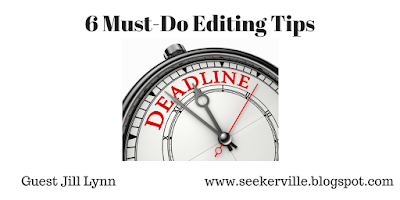My 6 Must-Do Editing Tips
by Guest Jill Lynn
For me, there is nothing quite as daunting as a looming deadline. That moment I have to hand my book baby over to my publisher even though I’m not ready to give it up. That moment I know it’s the last time I’ll see it before it goes to print.
 Image credit: Crestock 4790187-by donskarpo
Image credit: Crestock 4790187-by donskarpo
My first book was the hardest to release. I prayed over it, hoping with everything in me that it was right and good and entertaining and un-put-down-able. That it would survive out in a world where people toss around one star reviews like confetti, often forgetting there’s a person behind the title and cover.
Since then I’ve learned that many of my fears were unfounded. I often get emails and messages from people who tell me how much they enjoyed a book. There are a lot of precious and supportive reader friends out there. And yes, I’ve had one star reviews, but I’ve also come to the conclusion that I can’t please everyone—a good life lesson.
The One I serve is the One who matters. And so once I’ve written a book and sent it out into the world, I try not to read reviews. I know at that point I have given my all to a book, and it’s time to let it go.

But before I send in a book, there are a few things I do (besides hope and pray :)) to ensure that I’m releasing my best possible work.
Here are my favorite editing tips:
1. Print the manuscript out.This might cost you some paper, but it’s worth it. There’s something about seeing the words in print that allows the eye to catch phrases or words that are repetitive or not working well together. It can also be easier to flip back through the pages and check on a question or phrase than it is to scoot back through an electronic copy. I can leave myself notes and questions in the margins or highlight what might be a concern so I can come back to it later.
2. Take a break from the book.If you can find any time before the book is due to set it aside—even for a week or two—and then come back to it before your final editing, take advantage of this. By the end, before I hand a book in, I’m over it.I’m so done with the book I don’t ever want to see it again. But by the time it releases, I’m happy to see those characters living in print. Edits are the same way—we get bogged down in minor details, and we’ve read the same thing over and over so many times it’s like white noise. If you can step away from the book and come back to it later, you’ll see things with renewed eyes.
3. Listen to the book.This is the most important one in my opinion! If you’re only going to do one of these things, make sure listening to the book is it. The mind often corrects words when reading, but that doesn’t happen when you listen to the book. I have caught SO MANY things in my books this way. I can’t stress this enough. I do it through Microsoft Word. (Here’s the site I followed for adding the button to my Word docs: Click here.)
I usually just highlight one page at a time and listen. It’s a monotone voice, which I don’t mind because it eliminates the emotion and helps me to simply hear the words. Listening helps me catch words that are spelled wrong or missing a letter. Sometimes I’ll even hear that I’ve used a similar word to the one I was thinking of, but it is in fact the wrong word. You might want to quit halfway through listening to the book because it’s a time commitment. (I read so much faster than the computer reads to me.) But I have never regretted taking the time to listen to my book. I’m always amazed by what I catch.
4. Search for double spaces after a period.This one is easy-peasy and quick. Just open the find box in Microsoft Word and type in a period with two spaces after it. It will pull up any spots that you accidentally have two spaces after a period and you can correct them.
5. Keep a list of your overused words so you can search and destroy.
This part can be draining because it’s tedious, but it is so worth it. Your overused words might be different for every book, but if you give yourself some space and then read through it, (or listen to it) you will find them. (You can search to see how many times you’ve used a word in the “find” box in Microsoft Word.) I’m not talking about “and” or “you” here. I’m talking about words that are unique to your writing that are being overused. Or motions that you have a habit of using. Like raised eyebrows or sighs. I keep a list of my most overused on my computer and they usually pop up in each book when I look for them.
6. Know when to quit editing.I confess—I never feel truly ready to hand in a book. I wish I did. But I can be a bit of a perfectionist, and a book will never be perfect. Sigh. So it’s hard for me to hand a book over to my editor. I look for two signs to help me know when I need to stop editing or messing with a book. When I’ve worked it over so many times that I’m beginning to change things (again) that I’ve just recently changed. And when I’m making things worse instead of better. That’s when I say a prayer, hit send and release my book baby.
I’d love to hear your editing tips—do you have any favorite things you do before sending off a book or manuscript?

Jill Lynn writes small-town happily ever afters filled with humor, grace and faith. She lives near the beautiful Rocky Mountains with her husband and two children and can be found online at Jill-Lynn.com or on Facebook and Instagram @JillLynnAuthor. Her latest release, The Rancher’s Surprise Daughter, is available now.
For me, there is nothing quite as daunting as a looming deadline. That moment I have to hand my book baby over to my publisher even though I’m not ready to give it up. That moment I know it’s the last time I’ll see it before it goes to print.
 Image credit: Crestock 4790187-by donskarpo
Image credit: Crestock 4790187-by donskarpoMy first book was the hardest to release. I prayed over it, hoping with everything in me that it was right and good and entertaining and un-put-down-able. That it would survive out in a world where people toss around one star reviews like confetti, often forgetting there’s a person behind the title and cover.
Since then I’ve learned that many of my fears were unfounded. I often get emails and messages from people who tell me how much they enjoyed a book. There are a lot of precious and supportive reader friends out there. And yes, I’ve had one star reviews, but I’ve also come to the conclusion that I can’t please everyone—a good life lesson.
The One I serve is the One who matters. And so once I’ve written a book and sent it out into the world, I try not to read reviews. I know at that point I have given my all to a book, and it’s time to let it go.

But before I send in a book, there are a few things I do (besides hope and pray :)) to ensure that I’m releasing my best possible work.
Here are my favorite editing tips:
1. Print the manuscript out.This might cost you some paper, but it’s worth it. There’s something about seeing the words in print that allows the eye to catch phrases or words that are repetitive or not working well together. It can also be easier to flip back through the pages and check on a question or phrase than it is to scoot back through an electronic copy. I can leave myself notes and questions in the margins or highlight what might be a concern so I can come back to it later.
2. Take a break from the book.If you can find any time before the book is due to set it aside—even for a week or two—and then come back to it before your final editing, take advantage of this. By the end, before I hand a book in, I’m over it.I’m so done with the book I don’t ever want to see it again. But by the time it releases, I’m happy to see those characters living in print. Edits are the same way—we get bogged down in minor details, and we’ve read the same thing over and over so many times it’s like white noise. If you can step away from the book and come back to it later, you’ll see things with renewed eyes.
3. Listen to the book.This is the most important one in my opinion! If you’re only going to do one of these things, make sure listening to the book is it. The mind often corrects words when reading, but that doesn’t happen when you listen to the book. I have caught SO MANY things in my books this way. I can’t stress this enough. I do it through Microsoft Word. (Here’s the site I followed for adding the button to my Word docs: Click here.)
I usually just highlight one page at a time and listen. It’s a monotone voice, which I don’t mind because it eliminates the emotion and helps me to simply hear the words. Listening helps me catch words that are spelled wrong or missing a letter. Sometimes I’ll even hear that I’ve used a similar word to the one I was thinking of, but it is in fact the wrong word. You might want to quit halfway through listening to the book because it’s a time commitment. (I read so much faster than the computer reads to me.) But I have never regretted taking the time to listen to my book. I’m always amazed by what I catch.
4. Search for double spaces after a period.This one is easy-peasy and quick. Just open the find box in Microsoft Word and type in a period with two spaces after it. It will pull up any spots that you accidentally have two spaces after a period and you can correct them.
5. Keep a list of your overused words so you can search and destroy.
This part can be draining because it’s tedious, but it is so worth it. Your overused words might be different for every book, but if you give yourself some space and then read through it, (or listen to it) you will find them. (You can search to see how many times you’ve used a word in the “find” box in Microsoft Word.) I’m not talking about “and” or “you” here. I’m talking about words that are unique to your writing that are being overused. Or motions that you have a habit of using. Like raised eyebrows or sighs. I keep a list of my most overused on my computer and they usually pop up in each book when I look for them.
6. Know when to quit editing.I confess—I never feel truly ready to hand in a book. I wish I did. But I can be a bit of a perfectionist, and a book will never be perfect. Sigh. So it’s hard for me to hand a book over to my editor. I look for two signs to help me know when I need to stop editing or messing with a book. When I’ve worked it over so many times that I’m beginning to change things (again) that I’ve just recently changed. And when I’m making things worse instead of better. That’s when I say a prayer, hit send and release my book baby.
I’d love to hear your editing tips—do you have any favorite things you do before sending off a book or manuscript?

Jill Lynn writes small-town happily ever afters filled with humor, grace and faith. She lives near the beautiful Rocky Mountains with her husband and two children and can be found online at Jill-Lynn.com or on Facebook and Instagram @JillLynnAuthor. Her latest release, The Rancher’s Surprise Daughter, is available now.
Published on July 29, 2018 21:01
No comments have been added yet.



